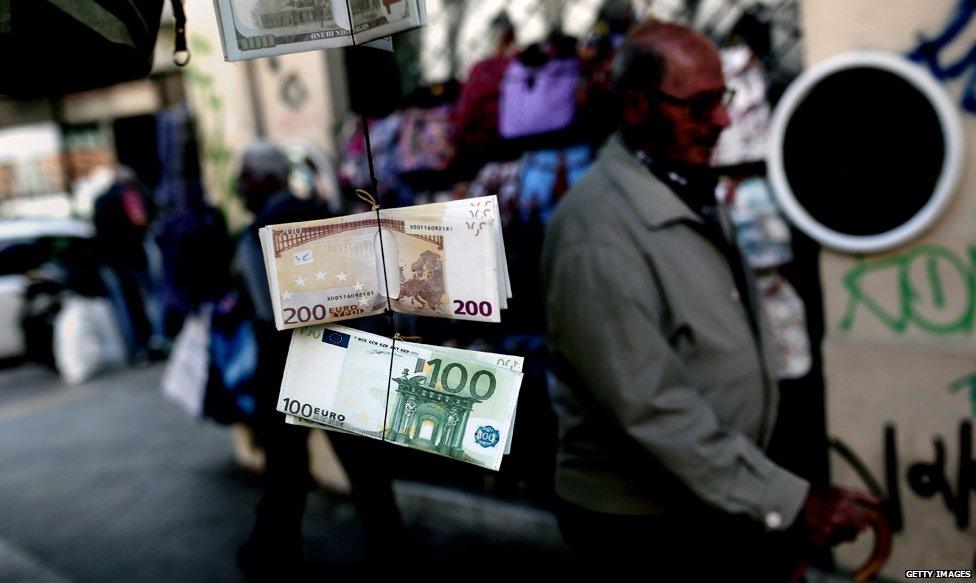How serious is missed IMF payment?
- Published
- comments

If you had asked me even a few months ago what event could cause devastating shock waves to roll over financial markets, and seriously set back the global economic rival, well Greece missing a payment to the IMF would have been one of them.
But here we are on Friday morning, Greece has announced it is missing today's payment, and the world feels pretty much as it did yesterday.
Shares were down a bit overnight in Asia. I would be surprised if European stock markets didn't open a bit lower.
And I would also expect German government bond prices to reverse their recent falls and rise a bit (anxious investors tend to pile into German official debt when they are feeling anxious).
But none of that feels existentially challenging.
So why is Greece's refusal to stump up 300m euros an apparent non-event?
Well the first thing to say is that it is not a non-event.
The symbolism of Greece's request to defer the payment - the first such deferral since the 1980s and probably the first ever deferral by a developed economy - is incredibly powerful.
Whether they like it or not, it represents a massive humiliation both for Greece's Syriza government and for its creditors, eurozone governments, the European Central Bank and the IMF itself - in the sense that they have been working day and night to avoid this impasse, and they have failed.
But it is not the end of the road for Greece's reputation as a so-called "good" debtor - in the sense that, as I have said, Greece has asked to defer the payment, and indeed a series of payments due during the course of this month, into a single sum of 1.5bn euros, to be handed over to the IMF at the end of June.
Or to put it another way, the moment of truth for Greece's fiscal credibility (well whatever is left of it) and the attempts by its government and the eurozone/IMF creditors to stitch up a short term fix has been postponed, yet again.
That said, no-one should be under any illusion, any longer, that the risk of Greece becoming a defaulter is now not very high. And the probability of it leaving the eurozone is higher than it's ever been.
Right now the acknowledged division between Greece and the eurozone/IMF is over the scope of Vat increases and pension cuts.
Or to put it another way, it is more about the scope of austerity than the scale. The two sides aren't that far apart on mandated surpluses to be generated by the Greek government - a convergence that seemed almost inconceivable just a few days ago.
So just maybe the additional negotiating time purchased by the IMF payment debacle will finally (finally!) lead to an entente on a formal agreement to conclude the current bailout phase and release more than 7bn euros of desperately needed cash to Greece.
Or maybe it won't.
Forecasting the outcome of these talks has been a job for mystics in recent weeks, and that hasn't changed. For what it's worth, for example, the seers at the Treasury all thought Greece was heading for the euro exit, whereas those at the Bank of England have been telling me a rescue would be found.
Don't trust anyone who says they know where this will all end.
But there are three things to say.
First is that even if there is a deal, that may not be the happy-ever-after - because Tsipras may be obliged to put the deal to the Greek people, either in a referendum or a general election, given that it would be a million miles from the platform of no-more-austerity on which he was elected.
And who knows whether the Greek people would then do the right thing, or even what the right thing would be.
Second, if there is no deal that inevitably means the imposition of painful capital controls in Greece, to prevent every last euro in the country being taken offshore by panicked investors.
As a minimum, that would tip the country into yet another deep and dark recession, because all access to credit would vanish.
Third, Greece in default would not necessarily mean Greece leaving the euro. There would be a possibility of its debt being reconstructed, and of its banks being recapitalised by imposing hideous losses on their creditors, as a precursor to some kind of financial rehabilitation while remaining inside the euro.
But once Greece was heading back to penury in that way, the great temptation (perhaps a false one) of the government and its creditors would be to see continued euro membership as a crippling economic weight - because the value of the euro would probably be perceived as too high to allow companies to successfully export and debtors to keep up the payments.
The prospect of default and Grexit are two sides of the same coin - namely Greece's madly excessive debts.